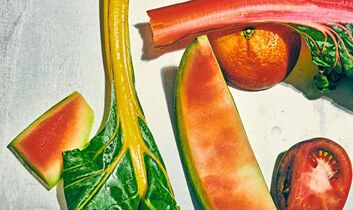如何避免食物浪费?
|
Save those fruits before they turn. For example, you can place ripe bananas on a sheet pan, with the skins intact, and bake them for 15 minutes at 350 degrees until the peels are black, according to "Waste Not." "Once cool, peel the roasted bananas and freeze in a zip-lock bag. They won't darken in the freezer, and they're perfect for smoothies and banana bread," the authors write. Similarly, lay individual berries on a baking sheet or plate and freeze them overnight, uncovered. Once frozen, store the berries in resealable bags in the freezer. "You can easily pluck them out just a few at a time and put them straight in the bottom of your bowl before topping with hot oatmeal, or add to a smoothie for more texture."
Select restaurants based on their food waste policies. Does the chef at your favorite restaurant use whole vegetables? Does he adopt a nose-to-tail philosophy when using animals? These practices (or lack of them) can affect a diner's decision on where to eat, but they're particularly important to millennials, who are "increasingly value-driven," Reichenbach says. Get closer to the source of your food. Colicchio recalls how his grandparents, who livedthrough the Depression, would "fry bacon in the morning and save the grease." They were part of a generation that valued food, in part, because they were close to the people who grew or sold the products. They went to the butcher for meat. They visited produce stands for vegetables. But as the country became wealthier and created agricultural and manufacturing systems that could produce cheap and convenient products, Americans became increasingly disengaged from people all along the food chain. "It's human potential that we're wasting because we don't know that person, so we don't value their work. That's something that I would encourage people to do: Go out there and know the person who is producing the food," Colicchio says. "My wife jokes around that I have the soul of a Depression-era housewife because I tend to save stuff," he adds. |









